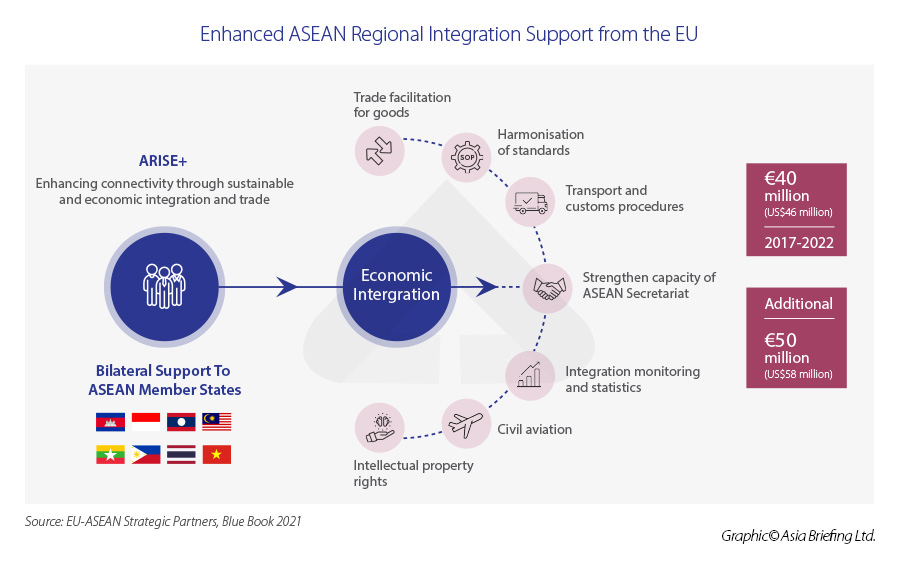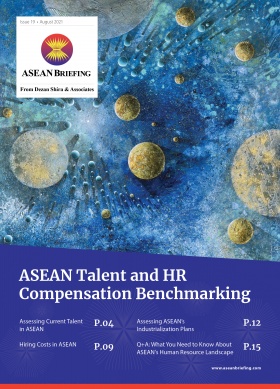EU-ASEAN Trade Facilitation: The ARISE Plus Program
The ASEAN Regional Integration Support by the EU (ARISE) was an EU-led trade facilitation program between 2013 to 2016. The program consisted of three components:
- High-level capacity building;
- Supporting the development and realization of single market goods; and
- Enhancing the capabilities of the ASEAN Secretariat to support the ARISE program.
The EU has since continued its support for the facilitation of trade to ASEAN countries and greater economic integration of the bloc through ARISE Plus. The program also supports the implementation of the ASEAN Economic Community Blueprint (AEC) 2025. From 2017-2022, the ARISE Plus program will provide €40 million (US$46 million) to enhance economic integration and an additional €50 million (US$58 million) from 2019 onwards for country-level trade support programs.
What are the components of ARISE Plus?
The ARISE Plus program consists of four main components.
a) Trade facilitation and transparency
Under this component, the program supports the streamlining of non-tariff measures and the transparency of trade laws and regulations. Furthermore, the program aims to enhance private sector engagement through three initiatives, namely:
- The ASEAN Trade Repository (ATR) – which provides a single online access point for all trade-related information of ASEAN members.
- The ASEAN Solutions for Services, Investments and Trade (ASSIST) – which is a trade facilitation tool that helps ASEAN-based businesses find solutions on cross-border issues related to the implementation of ASEAN economic agreements.
- The ASEAN Customs Transit System (ACTS) – which is a customs transit management system officially launched in November 2020 that assists businesses who move goods across borders without paying the required duties and taxes.
b) Standards and conformity assessment
This component aims to support and standardize regulations, particularly for agro-food sectors and healthcare, by reducing the technical barriers for intra-ASEAN trade.
ASEAN has long acknowledged the need for a regional trademark system and the concept was first introduced in 1995 through the ASEAN Framework Agreement on Intellectual Property Cooperation.
ARISE Plus has since supported ASEAN in developing the Common Guidelines for Substantive Examination of Industrial Designs and the ASEAN Common Guidelines for Substantive Examination of Trademarks, which will serve as the foundation for establishing an ASEAN trademark registration system.
Developing a regional trademark registration system is of particular importance considering the economic structure of ASEAN is dominated by small and medium-sized enterprises whose export products and services make up 30 percent of ASEAN national exports. From these export products and services, 60 percent is developed in intellectual property rights-intensive sectors.
Moreover, with greater ASEAN integration expected, the issues surrounding intellectual properties will become more complicated, especially with the rise of the region’s booming tech start-up industries.
c) Customs and transport
ARISE Plus also aims to support the harmonization of customs and cross-border transport through tools such as the ACTS. The EU has contributed some €10 million for the development of the ACTS.
As an integrated online customs system, the system is cost advantageous and simple as businesses are required to complete only one (final) customs regime and are therefore not required to transfer their goods to a different transport in each country. The taxes and duties are covered by a single guarantee for all the countries involved in the transit.
The removal of regulatory barriers in the EU through the Common and Community Transit System has increased regional trade by three percent, or €15 billion (US$17 billion). Similar savings can be achieved in ASEAN through the ACTS, particularly as infrastructure continues to improve across the region.
Further, the ACTS will also improve the ability of ASEAN customs authorities to prevent and detect smuggling and fraud.
d) ASEAN economic integration monitoring
The component supports the monitoring and evaluation of the AEC 2025 framework and integration progress. Activities of this component will:
- Strengthen the research capacity of the ASEAN Secretariat;
- Provide technical support to the ASEAN Integration Monitoring Division (AIMD);
- Strengthen the role of the ASEAN Community Statistical System (ACSS) as the main statistical entity in ASEAN;
- Create awareness and outreach of the ASEAN Secretariat; and
- Raise awareness of the progress of AEC integration.
About Us
ASEAN Briefing is produced by Dezan Shira & Associates. The firm assists foreign investors throughout Asia and maintains offices throughout ASEAN, including in Singapore, Hanoi, Ho Chi Minh City, and Da Nang in Vietnam, Munich, and Esen in Germany, Boston, and Salt Lake City in the United States, Milan, Conegliano, and Udine in Italy, in addition to Jakarta, and Batam in Indonesia. We also have partner firms in Malaysia, Bangladesh, the Philippines, and Thailand as well as our practices in China and India. Please contact us at asia@dezshira.com or visit our website at www.dezshira.com.








